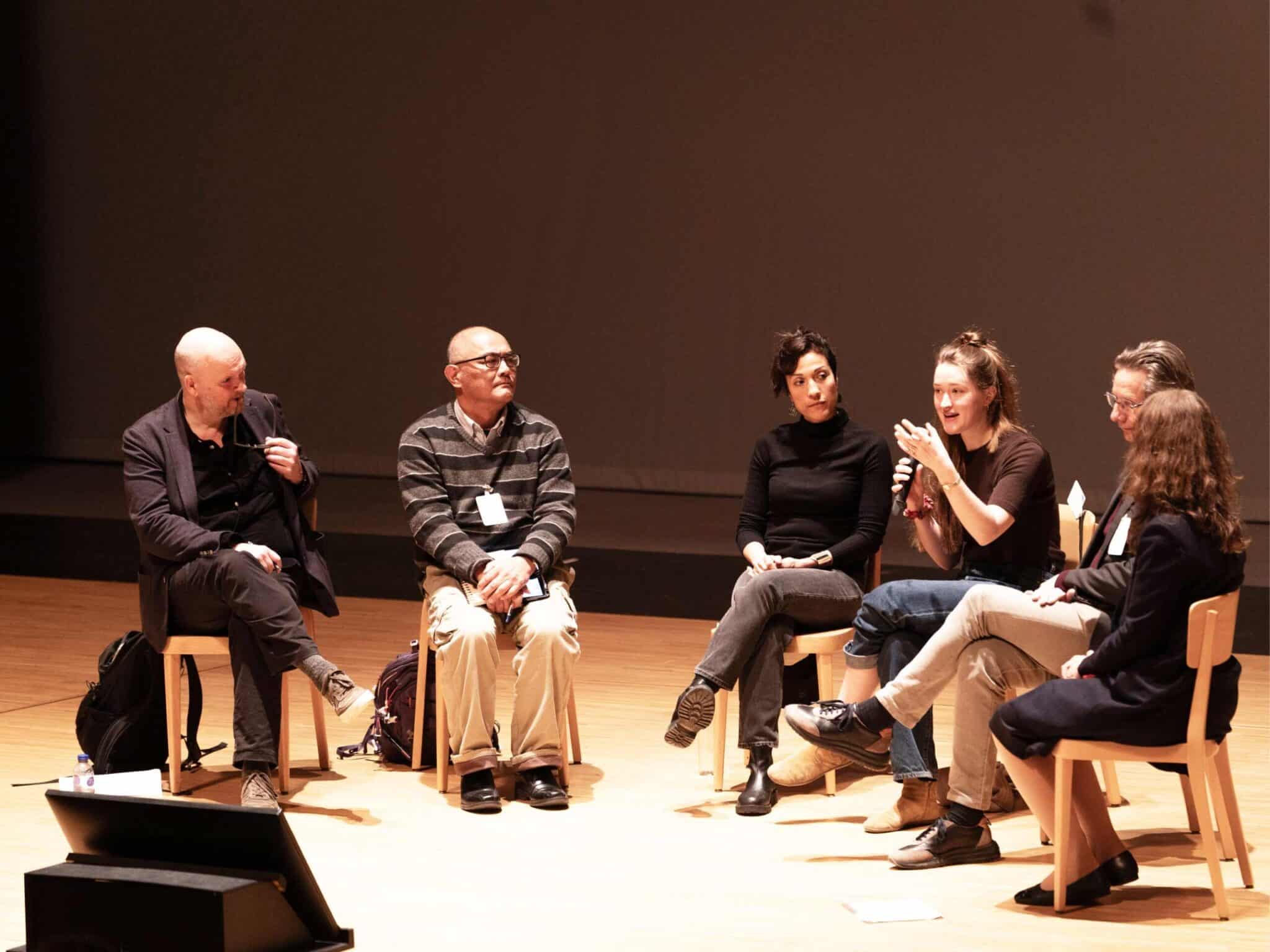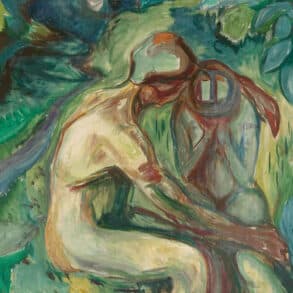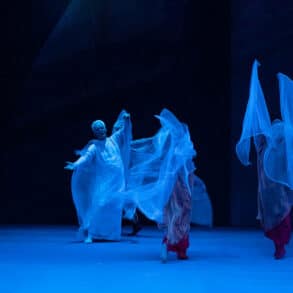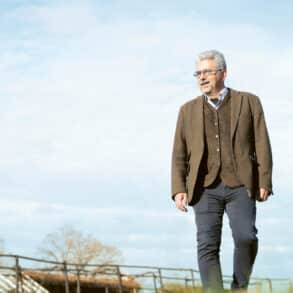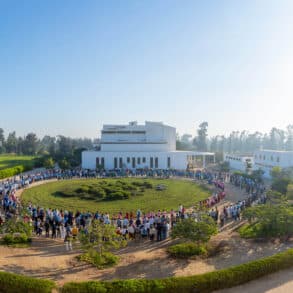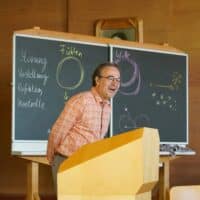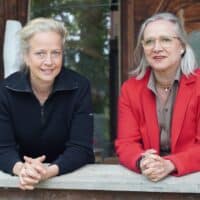Teaching means taking responsibility. In keeping with the times, our relationships need to be reformed, rethought, and redesigned. Cristina Velasquez from Brazil and Neil Boland from New Zealand jointly developed a new image of teaching at the recent teacher trainers’ conference at the Goetheanum.
Neil Boland When I talk about education, I often use universal terms. But I also realize that education is never universal. It is always specific. It is practiced by certain people at certain times in certain places in certain cultural and social contexts. It can never be universal.
Cristina Velasquez A person’s identity emerges from the encounter between oneself and the other. Other people help me to recognize who I am, and it’s through dialogue with others that each person becomes unique. Plurality is the law of the Earth. Learning to live in plurality is a basic exercise that constitutes a central task of education and brings us the idea of alterity in place. Where I come from, in Brazil, this plurality arises from the development of intercultural encounters and relationships against a social-cultural backdrop. It’s important to re-evaluate how we structure and care for those encounters. To do this, we need to understand how we are all influenced by our history. This raises the question of how we can create good encounters in colonized countries.
A veil has been placed over the Brazilian indigenous people, hiding their cultural richness. This can lead to dehumanization, disempowerment, and the loss of cognitive freedom. These veils can descend on us, preventing us from seeing each other clearly and recognizing ourselves. Veils are woven from information, which comes from places, positions in society, histories, education systems, and influences we received while we were young. They influence our attitudes and choices. if we adhere to a colonialist logic that disregards diverse epistemologies, we risk perpetuating an “epistemic siege.” The challenge is to authentically engage with the other in a way that honors and preserves their unique contribution to and in our collective understanding.
By fostering an educational environment that honors difference and encourages dialogue, we counter dominant forms of knowledge and build a more inclusive, empathetic, and understanding society. Frantz Fanon’s1 insightful analyses of the intricate interplay between the self and the other, particularly within the context of racial and colonial dynamics, shed light on the barriers to authentic human connections and pathways to societal transformation. These negatively affect both the colonizer and the colonized. By internalizing social and historical constructs of race, inequality, and oppression are perpetuated through prejudice, stereotypes, and often unconscious discrimination. The journey of decolonization is not only about recognizing the destructive nature of racial constraints but also about redefining what is considered normal.
By challenging the monoculture of the mind, we advocate for a society that embraces diversity of values and epistemologies, and fosters a multiplicity of spiritual expressions. In this diversity, we have the human condition in common. It is the foundation for a vibrant, resilient, and just global community.
Preparing the Space
Neil Boland If you relate these ideas to teacher education, the essence of teaching is what happens between the educator and the student. In traditional Western forms of teaching, this can be one-way: the teacher talks and the student listens. As a teacher, how long did I talk before I gave over the reins or the power to my students? Last year, I asked a group of Waldorf education postgraduates what teaching and learning methods really worked for them. What they definitely didn’t want was to be talked at—that put them to sleep. They would rather have a discussion, interaction, contact, engagement, encounters. How and especially where does that encounter take place? So, my job as a teacher trainer is to create a space in which mutual learning can take place. That requires openness, acceptance, safety, curiosity, and love. In 1994, Indian scholar Homi Bhabha used an old idea of the third space as a metaphor. It is a liberated space, where people can meet freely, free of hierarchies and pasts. In it, the veils can be lifted from people’s eyes, so they can see and be seen. It brings us into a territory that belongs to nobody but also to everybody—a space in which we are only united by our uniqueness.
So, what does it mean for a teacher trainer to seek to operate in this neutral territory? It means that I have to leave the territory that I normally occupy, where I’m most comfortable, and go into this borderland of opportunity. I have to teach as if I’m not forming any kind of a center. My adult students also need to leave their accustomed places and go into this place of encounter where we’re only united as individuals. Can we hear what they bring into the room with them? Can we begin to listen into who they actually are? And are we able to create this safe territory in which everybody is able to begin to unpack the person they actually are so that they can be perceived and met? For this, I need to move out of my comfort zone. Because disruption and discomfort are essential parts of learning. In discomfort, you are constantly crossing new thresholds; you’re constantly developing.

Intentional Intersectionality
Cristina Velasquez A teacher today faces a very different, difficult, multifaceted, and complex task. Issues like gender, feminism, racism, colonialism, and discrimination can’t be separated from each other. We come to the idea of intersectionality. In Brazil, I worked with different indigenous groups to discover the way that they know, educate children, raise young teenagers, and how elderly people help each other. Ivan Illich introduced the concept of creating spaces for experiences of coexistence as a practical approach, linked to the necessity of de-schooling societies. How could Waldorf teacher training courses adapt to this and open spaces to bring about experiences of coexistence, which are fundamentally about socialization and shared social experience? And also take into account the epistemology of Waldorf education and some other epistemologies? In adult education, an essential question is who the teacher trainer is and how their internal landscapes shape them. In our training courses, the process of inner questioning is an open space for every student, teacher, or lecturer. We need to change our perception of time and foster a dialogical interaction that foregrounds the collective experience between us.
Neil Boland The expectation that teaching will be informed by research is also a question of who is actually teaching. Research-led teaching, if you want to call it that, is not the same as teaching out of experience, which has gone through a rigorous process and hopefully is actually the result of the work of the teacher trainer themselves. It’s even better if it’s out of the combined work of the teacher trainer and the student teachers. As we all know, research can take many different forms—it doesn’t have to be academic; it can be artistic or meditative inquiry. All of these are perfectly good ways of creating knowledge. The essential thing is that the teacher trainer extends this knowledge and is seen to be extending it constantly. And in an ideal world, the student teachers would be actively involved in this work, too.
Social Responsibility in Teacher Training Institutions
A whole range of people, from Plato to Helen Keller to Malcolm X to Nelson Mandela, have spoken across millennia about the importance of education in creating social realities. That places a tremendous responsibility on educators. Education can help find new social forms, or it can reproduce what is existing and perpetuate old social realities, not all of which we may want. What form of social reality do you want to aim towards? How do you see society being created by the work that you do? Education needs to look at the indications of the time, how we sit in relation to the time that we live in. What directions does the world appear to be moving in, socially? Like Otto Scharmer asks in Theory U: can we lean into the future and try to listen to what is trying to come into being? This kind of process is essential for any educational movement that wants to remain current.
Rudolf Steiner’s well-known lecture “The Work of the Angels in the Human’s Astral Body” (GA 182, Zurich, October 9, 1918) looks at social forms far in the future that are already striving to come into existence. It is work which is promoted by the activity of each individual’s angel during sleep. This is a stimulating and powerful image to work with. Steiner says that each person’s angel, acting in concert with other angels, is trying to imprint on our astral bodies that, in the future, no human being will be able to find peace in the enjoyment of happiness if others around them are unhappy. And, secondly, every human being shall see in each and all of their fellow human beings a hidden divinity. And lastly, it is possible for us to reach the spirit through thinking, to cross the abyss into the active perception of the spiritual world through clear thought.
Are we able to sense anything that is just beginning to come into being along these lines, which I would then say is our responsibility as teacher trainers? I believe we can definitely see signs of this attempt to find form in social discourse. It shows itself in the growing acceptance of differences, the move towards equity and tolerance, and the increased awareness and discussion of human rights. It finds expression in the growing realization that there are groups of people in all of our societies who are systemically discriminated against, silenced, oppressed, ignored, erased, made inferior, excluded, thought of as lesser, not thought of at all, dismissed, looked down on, rendered invisible, and denied humanity. It now seems to me that, increasingly, this is stopping. I asked students in two of my classes if they could think of any social trends, social movements, or things trying to come into being. What they thought was really emerging was a desire for equity, for an equal voice for everybody, for the acceptance of everybody, for a rebalancing of power inequalities, for the integration of non-Western ways of being and knowing, for the idea that we can’t have social justice until we have cognitive justice.
How can we actually be happy when there are so many people suffering in the world? It’s the idea that we can’t tolerate unfairness. Your sadness is my sadness. Your sorrow is my sorrow. Your pain is my pain. This really is a powerful ideal. How does this affect Steiner teacher training and its institutions? As I said earlier, education produces social realities. So, what realities do your institutions produce or reproduce? Are you doing some things that actually, albeit unintentionally, are doing the opposite of what you want? If you choose not to engage with such questions, you are supporting the status quo. How do you enact your social responsibilities? If you think, “What is my responsibility in producing the kinds of social reality which I would like to be?” then that hopefully acknowledges all; it meets everybody.

Cristina Velasquez I’m delighted to be part of the project carried by the Pedagogical Section on Interculturality for some years now and to realize that the impulse of Steiner education is in the process of realizing Steiner’s ideas for a future society and social responsibility, in accordance with questions of our students all over the world, without closing our eyes to the needs of the contemporary child. My Brazilian students in the bachelor’s program always thank us for the opportunity to discuss and interact rather than just listen, which works towards achieving presence in grounded ideas. In confronting the pedagogical dilemma faced by Waldorf education in Brazil and Latin America, we could infuse our curriculum proposals with cross-curricular themes, such as alternative perspectives on history and the philosophy of education.
These themes are not merely academic subjects. They are gateways to understanding the deeper role of education in human development and societal progress. We need to invite a much wider range of voices from all backgrounds to be present on this stage, to share their journeys, challenges, and successes. At the heart of our educational journey is the principle of allowing others to simply be and exist freely—to give them human dignity, to allow everyone to emancipate, and to have the opportunity to flourish and contribute to a more just and compassionate world.
Title image Discussion at the conference, photo: Xue Li

